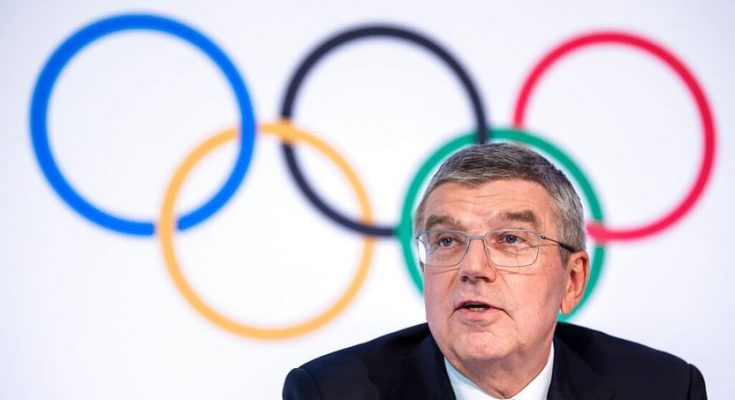International Olympic Committee President Thomas Bach says he understands why the rescheduled Tokyo 2020 Games would have to be cancelled if it cannot take place next summer.
Local organisers have said they have no back-up plan after the event was postponed by a year because of the coronavirus crisis.
“You cannot forever employ 3,000 to 5,000 people in an organising committee,” Bach told BBC Sport. “You cannot have the athletes being in uncertainty.”
In a wide-ranging interview, Bach also:
- admitted the job of re-organising the Games was “a mammoth task”
- warned that the event would “definitely be different” with a focus on “essentials”
- would not be drawn on whether a vaccine for Covid-19 would be needed for the event to take place
- insisted staging the Games behind closed doors was “not what we want”, but he needs more time to consider whether that was feasible
Bach said he hoped the first ever postponed Games, which are due to take place from 23 July to 8 August 2021, could prove “unique” and send “a message of solidarity among the entire world, coming for the first time together again, and celebrating the triumph over coronavirus”.
“There is no blueprint for it so we have to reinvent the wheel day by day. It’s very challenging and at the same time fascinating.”
Will a vaccine be found?
Japan’s Prime Minister Shinzo Abe has admitted it may be “difficult” to stage the Games if the country does not successfully contain the virus, and the head of the Japan Medical Association has suggested it depends on finding a vaccine.
When asked directly if he agreed, Bach said: “For this question, we are relying on the advice of the World Health Organisation.
“We have established one principle: to organise these Games in a safe environment for all the participants. Nobody knows what the world will look like in one year, in two months.
“So we have to rely on [experts] and then take the appropriate decision at the appropriate time based on this advice.”
The 2022 Beijing Winter Olympics are due to take place in China just six months after the Tokyo Games, and Bach said that Prime Minister Abe had made it clear to him that, as far as Japan was concerned, next summer was “the last option”.
“Quite frankly, I have some understanding for this, because you cannot forever employ 3,000, or 5,000, people in an Organising Committee,” said Bach.
“You cannot every year change the entire sports schedule worldwide of all the major federations. You cannot have the athletes being in uncertainty.
“You cannot have so much overlapping with a future Olympic Games, so I have some understanding for this approach by our Japanese partners.”
When asked how confident he was that the Games would go ahead, Bach said: “We have to be prepared for different scenarios. There is the clear commitment to having these games in July next year.
“At the same time, looking at the scenarios this may require towards the organisation, with regard to health measures, these maybe need quarantine for the athletes, for part of the athletes, for other participants.
“What could this mean for the life in an Olympic Village and so on? All these different scenarios are under consideration and this is why I’m saying it’s a mammoth task, because there are so many different options that it’s not easy to address them [now]. When we have a clear view on how the world will look on 23 July, 2021, then [we will] take the appropriate decisions.”
The director general of the World Health Organisation (WHO), Tedros Adhanom Ghebreyesus, has said it is possible but “not easy” for 11,000 athletes from more than 200 teams to come together in Tokyo.
Japan has recorded more than 17,100 cases and 797 deaths from the pandemic, but the numbers of infections are falling sharply and it has been affected far less than some other countries.



